Of the eight countries who have qualified for the 2018 World Cup European play-offs, three of them – Croatia, Italy and the Republic of Ireland – were involved in the first Uefa play-offs held 20 years ago for qualification to the 1998 World Cup in France. At the play-offs in 1997, we witnessed the emergence of future star players, the end of a few careers, the arrival of new nations, the departure of another and one of the most extraordinary two-legged ties in international football.
After the collapse of the Soviet Union and the break-up of Yugoslavia in the early 1990s, there was a rapid expansion of countries admitted to Uefa in the run-up to the 1998 World Cup. With France entering automatically as hosts, there were 14 places available for the remaining 49 European teams as opposed to the 12 slots made available for 37 teams in 1994. Among the dozen debutants were newly independent Balkan countries such as Bosnia-Herzegovina and Macedonia, plus former Soviet states such as Georgia and Moldova.
Whereas in 1994 the top two teams from six groups had gone through, for the 1998 World Cup the 49 European teams were divided into nine groups, with the nine group winners and one best placed runner-up advancing automatically. That 10th qualifier just happened to be Scotland, who have not been at a major tournament since. The remaining eight runners-up were destined for the play-offs and, like now, they contested the four remaining spots over two legs, home and away. Unlike the current schedule, all four first legs were played on the same day, Wednesday 29 October, with the second legs played on Saturday 15 November.
Croatia 3-1 Ukraine
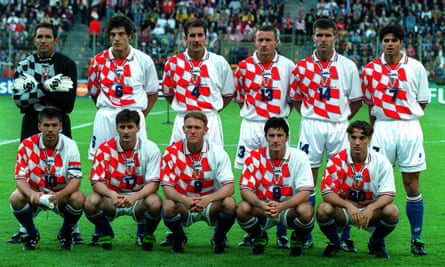
Two of those recently established countries, Croatia and Ukraine, kicked things off in Zagreb. The honour of scoring the first ever goal in a European World Cup play-off match fell to a centre-back, Croatia’s Slaven Bilic. This turned out to be Bilic’s last goal in international football. He only scored three goals in his 44 international appearances but he clearly had a penchant for notching landmarks. A year earlier, his opening goal in their group match against Bosnia-Herzegovina had been Croatia’s very first goal in a World Cup qualifier.
Croatia went on to win the first leg 2-0 and, after conceding an early goal to Andriy Shevchenko in Kiev, they drew the second leg 1-1 to progress to France. They performed admirably in their eye-catching red and white checked shirts, reaching the semi-finals before losing to the hosts. The high point was Davor Suker’s jinking run and (unusual) right-footed finish to seal a convincing 3-0 victory over Germany in the quarter-finals. Suker ended the tournament with six goals and the golden boot as Croatia beat Holland to finish third in the tournament, establishing themselves on the world football map at the first time of asking.
Russia 1-2 Italy
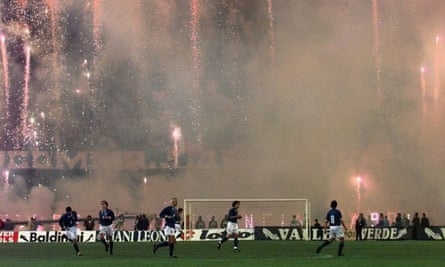
Russia, another country contesting World Cup qualifiers under a new identity, faced mighty Italy, who had reached the final of the previous tournament in USA after finishing third in their home World Cup in 1990. The first leg in Moscow was notable for the debut of a 19-year-old Italian who came on as a substitute for injured goalkeeper Gianluca Pagliuca. Twenty years on and 173 appearances later, Gianluigi Buffon is now the most capped Italian (and European) in history. Buffon did not concede to an opponent on his debut but he was beaten by an own goal from Fabio Cannavaro, scored three minutes after Christian Vieri had given Italy the lead.
The young goalkeeper did not play in the second leg in Naples, which Italy won 1-0 thanks to a goal from a player who was coming towards the end of his career. Pierluigi Casiraghi was the matchwinner, scoring what proved to be his last goal in a competitive game for Italy. He didn’t make it into Cesare Maldini’s squad for the World Cup, where Italy were beaten by France on penalties in the quarter-finals.

Republic of Ireland 2-3 Belgium
The third tie pitched the Republic of Ireland against Belgium. After Jack Charlton’s pragmatic approach to nationality and tactics had taken Ireland to the their first World Cup in 1990 and then to USA 1994, it was up to Mick McCarthy to lead the country to their third consecutive finals. The Ireland team included a 21-year-old Shay Given in goal and 20-year-old Ian Harte at full-back, alongside a clutch of thirty-somethings, such as the much-travelled Tony Cascarino, who was playing his club football in Marseille at the time.
Crucially, midfield lynchpin Roy Keane missed both games through injury. The home leg at Lansdowne Road started well enough for McCarthy’s team, with 31-year-old Denis Irwin giving the home side a 1-0 lead early on with a sumptuous 30-yard free-kick. However, Luc Nilis equalised for Belgium in the first half with an equally impressive strike from just outside the penalty area. The game then petered out, with Belgium going back to Brussels for the second leg as narrow favourites to reach a fifth successive World Cup.
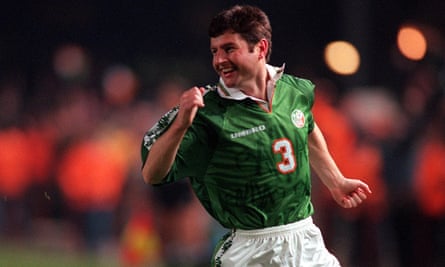
Luis Oliveira opened the scoring in Brussels before Ray Houghton’s looping header – his last goal for his country – drew Ireland level on the night and on aggregate. With 20 minutes left to play, Luc Nilis scored his second goal of the tie to give Belgium a 3-2 win on aggregate.
There were post-match recriminations over the referee’s decision to overturn an Irish throw-in that led indirectly to the winning goal, providing a parallel for what would happen 12 years later. But this controversy was not on the same scale as Thierry Henry’s handball in Paris in 2009 and there was certainly no offer of financial compensation for missing out on another World Cup appearance. Yet again Belgium went on to disappoint in the tournament itself. Despite remaining undefeated, they were eliminated at the group stage after drawing all three games. The Republic of Ireland bounced back in their qualifying campaign for the 2002 World Cup, going undefeated in a group containing Portugal and Holland to earn a place in a play-off against Iran, which they won 2-1 on aggregate.
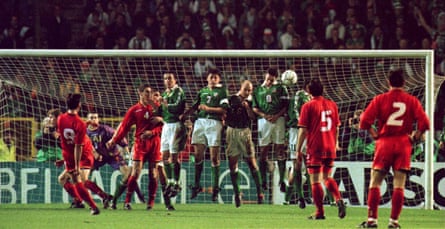
Hungary 1-12 Yugoslavia
Three of the play-offs were tense affairs with narrow winning margins and very little to choose between well-matched sides, but the fourth tie could hardly have been more different; there were more goals scored in the two matches between Yugoslavia and Hungary than in the other six combined.
Yugoslavia had been prolific scorers in their group – with 29 goals in 10 matches, they scored three more than group winners Spain – but Hungary were unbeaten at home in their group, so the first leg in Budapest looked like it might be a tight encounter. It was anything but.
Yugoslavia started the game in a hurry, going three up within the first 10 minutes. They kept their foot firmly on the Hungarians’ necks and did not ease up, going into the half-time break 5-0 up. After Real Madrid’s Predrag Mijatovic completed his hat-trick in the 50th minute, Yugoslavia took some pity on their hapless hosts and substituted him. The man who replaced Mijatovic, Aston Villa’s Savo Milosevic, scored Yugoslavia’s seventh goal of the night within 10 minutes of coming on before Hungary scored the consolation goal to outdo all consolation goals with two minutes remaining.
Despite being 7-1 up from the first leg, Yugoslavia did not relax in Belgrade. Milosevic hit the first goal before Mijatovic went one better than his first leg tally by scoring four. In case you have lost count, the final aggregate was 12-1.

The tie set all sorts of records, which have lasted through four more qualification campaigns. No other play-off has matched the 13 goals scored by Yugoslavia and Hungary (Spain 6–2 Slovakia and Switzerland 4–4 Turkey in 2005 came closest with eight goals each in 2005), while the biggest margin of victory since their 12-1 has been Turkey’s 6-0 victory over Austria in 2001. No other team has scored more goals over the two legs than Yugoslavia managed in the away leg alone. And the closest anyone has come to reaching Mijatovic’s record of seven goals across two legs was when Cristiano Ronaldo scored all four of Portugal’s goals against Sweden four years ago.
Yugoslavia emerged from the so-called group of death at the finals thanks to wins over Iran and USA plus a 2-2 draw against Germany – with Mijatovic inevitably scoring. They fell to a 2-1 defeat against Holland in the last-16 stage, with Edgar Davids’ injury-time goal proving decisive. Mijatovic, of all people, missed a penalty when he could have given his team the lead early in the second half. “Fate was against me,” he said. “It was the worst moment in my career. Van der Sar has a big reach, so I decided to blast it.” Mijatovic became the first player to miss a penalty in a World Cup finals (asides from in a shootout) since Gianluca Vialli had missed against USA at Italia 90, breaking a run of 38 successful spot-kicks.
It was to be Yugoslavia’s last participation in a World Cup, but at least they left some records that may never be broken. Hopefully the play-offs this November will be as entertaining, with another Mijatovic or Buffon emerging on the world stage. And, who knows, the Irish might even get the rub of the green for once .
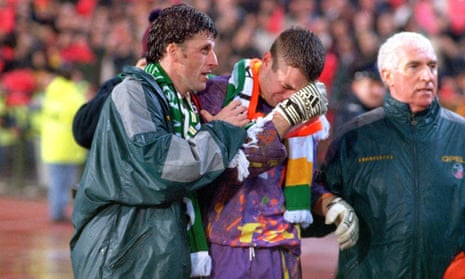
Comments (…)
Sign in or create your Guardian account to join the discussion